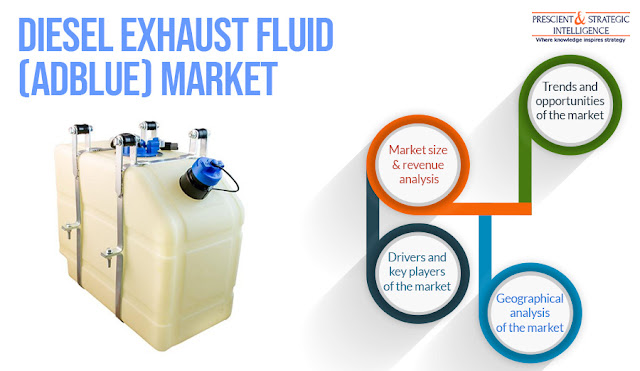Why Are Fleet Owners Turning to Diesel Exhaust Fluid to Mitigate Emissions?
After energy production, transportation is the biggest source of greenhouse gas (GHG) emissions. The population boom is being accompanied by the rising automotive sales. And, since most of the automobiles are still fueled by gasoline (petrol) and diesel, the air pollution problem continues to worsen. Therefore, the world is now focusing on electric vehicles (EV), and till the time the entire transportation sector of the world doesn’t transition to EVs, other steps are necessary to check GHG emissions. One of the ways most countries have adopted is making the engines, fuel, and exhaust systems of conventional automobiles cleaner.
As a result, P&S Intelligence expects the diesel exhaust fluid market size to increase to $20,518.0 million by 2023 from $12,191.5 million in 2017, at an 8.8% CAGR during 2018–2023. This is because diesel exhaust fluid, abbreviated as DEF and also known as AdBlue, accomplishes the selective catalytic reduction (SCR) of diesel, to convert harmful nitrous oxide emissions to simply nitrogen and water, which are not toxic. Thus, with the Environmental Protection Agency (EPA) Tier 4, Bharat Stage VI (BS VI), and Euro 6 emission standards prevalent across the world, the demand for DEF is surging.
Apart from transportation purposes, heavy-duty diesel engines are used for mining, construction, agricultural, and industrial purposes. Hence, while, currently, vehicles consume the higher volume of AdBlue, in the coming years, non-vehicular machines, such as cement mixers, mining conveyors, generators, and pumpsets, will display the faster-growing requirement for this chemical. Across the world, especially in the emerging economies of China and India, construction activities are booming due to the population explosion. This is also leading to an increasing need for metals and agricultural produce, which is why related operations are being mechanized.
In the coming years, with India and China taking similar steps, the fastest diesel exhaust fluid market advance will be witnessed in APAC. These countries are notorious for their disease-inducing air quality, which is why governments here have become rather strict on polluting vehicles. For instance, the Indian government has banned diesel vehicles over 10 years older in Delhi, one of the most-polluted cities in the world. And, the vehicles that are allowed are now subject to the stringent BS VI emission standards.
Therefore, with more governments suggesting or mandating an SCR system in diesel vehicles, the consumption of AdBlue will rise.



Comments
Post a Comment